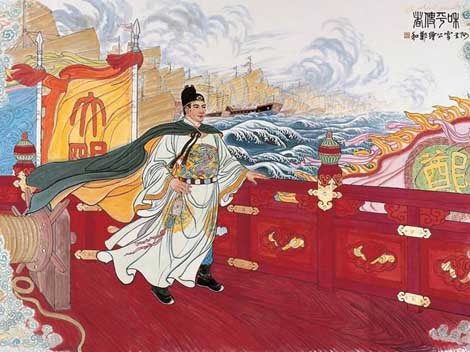Home »
Political Purpose of Zheng He's Voyages
» Political Purpose of Zheng He's Voyages
Political Purpose of Zheng He's Voyages
Written By Reduan Koh on Saturday 13 October 2018 | 08:50
States and leaders that recognized Ming supremacy and offered tribute were rewarded with diplomatic recognition, military protection and trading rights. By the end of Yongle's reign, 30 foreign states had paid official visits to the Chinese Emperor and offered tribute. Most were brought to China in luxurious quarters in the treasure ships.
One of the primary purpose of the voyages was to pick up and drop off ambassadors, envoys and tributes. Relationships were established with Buddhist and Hindu kingdoms and sultanates from Java to Mecca. The Chinese would not establish their own permanent bases within the tributary states," Boorstin wrote," but instead hoped to make 'the whole world' into voluntary admirers of the one and only center of civilization. With this in mind the Chinese navy dared not loot the states that it visited. Zheng He would not seek slaves or gold or silver or spices. Nothing would suggest that the Chinese needed what other nations had.
Much has been made about the non-colonial nature of the voyages. But China has done it share of expansionism: a the time of the voyages China was expanding southward and westward into land that traditionally did not belong to the Han Chinese. Some kingdoms along Zheng's routes were conquered and puppet rulers loyal to the Ming were installed.
Purpose of Zheng He's Voyages : Gunboat Diplomacy?
Dr. Christina Lin of Johns Hopkins University wrote: “With the image of Zheng He and his treasure ships bearing gifts and trade, the Chinese have weaved this into an intricate narrative of a peaceful rise, portraying the swift ascent of Chinese economic, military, and naval power as the latest phase in a benign regional dominance with its provenance in the Ming era... Nonetheless, despite China touting Zheng He's peaceful intentions.
Some scholars such as Geoff Wade from National University of Singapore observed the voyages were about ‘gunboat diplomacy’, coercion, and recognition of Ming dominance. While the primary mission of the treasure fleet was to display Ming power and engage in trade, Zheng He had a mandate to also collect tribute and establish ties with rulers all around the Indian Ocean shores. [Source: “Dr. Christina Lin is a Fellow at the Center for Transatlantic Relations at SAIS-Johns Hopkins University, January 2015.
The purpose was to establish suzerainty under Ming Empire, and this policy was institutionalized later in 1636 when ruler Hong Taiji established Lifan Yuan (various translations as court of colonial affairs, office of barbarian control, office of Mongolian and Tibetan affairs) that became Lifan Bu in the Qing Dynasty (1644-1911). Indeed if submission to the Dragon Throne was not forthcoming, Zheng He did not hesitate to intervene militarily. For example, the ruler of Sri Lanka refused to recognize the emperor and was taken to China as a prisoner, while similar fate befell two rulers in Sumatra.
Zheng's missions were intended to exert political and economic control across space rather than territorial control. By controlling economic lifelines of nodal points, networks, ports and trade routes, China was thus able to control trade. In do doing, a dominant maritime power reaps economic and political benefits by taking control of main port polities along major East-West maritime trade networks as well as the seas in between.
Related Post : Source : Wikipedia / factsanddetails



